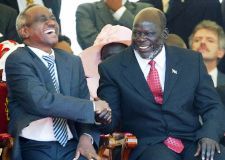Sudan peace pact could begin to unravel, warns ICG
Mar 31, 2006 (NAIROBI/BRUSSELS,) — The agreement that ended 21 years of war in Sudan could begin to unravel unless the parties refocus on their core commitments and the international community plays a much more supportive and forceful role, said a report by ICG think-tank.
 Sudan’s Comprehensive Peace Agreement: The Long Road Ahead, the latest report from the International Crisis Group, examines Sudan’s faltering Comprehensive Peace Agreement (CPA), signed by the ruling National Congress Party (NCP) and the rebel Sudan People’s Liberation Army/Movement (SPLA/M) in January 2005.
Sudan’s Comprehensive Peace Agreement: The Long Road Ahead, the latest report from the International Crisis Group, examines Sudan’s faltering Comprehensive Peace Agreement (CPA), signed by the ruling National Congress Party (NCP) and the rebel Sudan People’s Liberation Army/Movement (SPLA/M) in January 2005.
15 months in, there is little reason for optimism as the NCP systematically delays and undermines the implementation process, and the SPLM is in disarray.
“Sudan’s peace agreement is on shaky ground”, says Dave Mozersky, Crisis Group Senior Analyst. “The unstable partnership between a strong but unwilling NCP and a weak but committed SPLM is making the implementation process highly volatile”.
The CPA provides for a six-year interim period with democratic elections by 2009, followed by a self-determination referendum for the South.
Implementation of the agreement, however, has been an uphill battle, with the NCP exploiting the gaps within the CPA and the weaknesses of the SPLM to delay and frustrate the process. The SPLM is weak, still coping with its transition from a rebel movement to a government and with the untimely death of its late Chairman, Dr. John Garang, in July. A strengthened and better organised SPLM would help push implementation forward and hold the NCP.
A partnership between the two parties helped drive the negotiation process and remains the best strategy for the NCP’s longer-term political survival, but it has been discarded by the ruling party follow the death of Dr. Garang.
The NCP must begin to implement the agreement in good faith to help assure its political future in a peaceful Sudan by making partnership an attractive option to the SPLM, and unity an attractive option to southern Sudanese.
The international community has an enormous physical presence in Sudan today, led by a 10,000 strong UN mission (UNMIS) devoted to monitoring the CPA, but it has failed to live up to its envisioned role as a guarantor, and seems unwilling to seriously engage with the parties politically.
Beyond financial support, which has been promised but not yet delivered, concerned world actors must begin to coordinate and flex their political muscle to get the implementation process back on track.
“The CPA represents an historic opportunity to end Sudan’s recurring conflicts,” says Suliman Baldo, Crisis Group’s Africa Program Director. “But it cannot be allowed to fall apart during the implementation process, or future generations of Sudanese will experience the conflict all over again”.
For the full text of the report : http://www.crisisgroup.org/home/index.cfm?l=1&id=4055
(ICG/ST)
